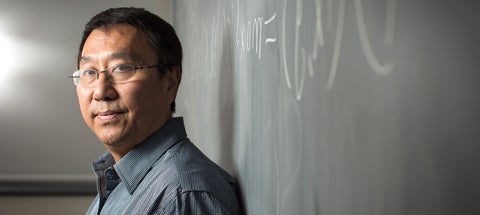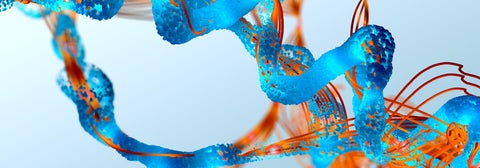Fighting cancer with code
Machine learning advances personalized vaccines
There’s a unique code written in the cancer cells of every patient’s body. And that data can be key to developing life-saving personalized cancer vaccines. But how can we decipher the code? Researchers at Waterloo’s Cheriton School of Computer Science have enlisted an unlikely ally in the quest: machine learning.
Cancer is the leading global cause of death
(World Health Organization)
People were diagnosed with cancer globally in 2022
(American Cancer Society)
people develop cancer in their lifetime
(World Health Organization)
Every patient is different and every cancer is different, so cancer treatment shouldn’t be the same for all.

Dr. Ming Li is a professor at the Cheriton School of Computer Science, University of Waterloo. Li and his team are applying AI and deep learning to develop tools that detect short peptides and neoantigens on the surface of a cancer cell using mass spectrometer paving the way for new cancer drugs and treatments.

Life-saving machine learning model
DeepNovo – Li and team’s new machine learning model – uses computer programs that can learn from data. DeepNovo analyzes data from mass spectrometry, looking for patterns in the fragments of peptides to solve complex peptide sequencing challenges. The more thorougher we discover peptides from the cancer cell surface, the easier it will be to develop therapeutic drugs or treatments for medical conditions, like cancer. DeepNovo is ground-breaking because it can be trained to work with different types of data sources, paving the way for cancer vaccines personalized to every patient.
Health futures
Rapid technological progress is reshaping healthcare on a global and personal level. Waterloo is harnessing our expertise where health, society, technology, and entrepreneurship converge, collaborating with partners on ground-breaking innovations that propel health and healthcare systems forward for everyone.
Explore more ways Waterloo is on it.
Eliminating stress with neurotech →
Learn how a Waterloo startup is tackling burnout with their wearable tech and AI-guided wellness app.
Stopping a stroke faster →
Explore how Waterloo entrepreneurs are revolutionizing stroke treatment with the world’s smallest camera.
Boost your knowledge. Subscribe to rich content.
Quick knowledge, big insights! Subscribe to the Innovation Insider for health, climate, tech, physics and human behaviour innovations in under two minutes.

